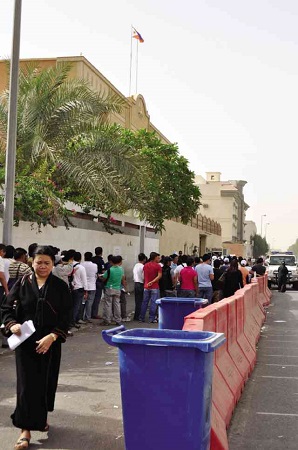Migrante braces for saudization, sets up hotline

LONG LINES Filipino workers line up outside the Philippine consulate in Jeddah to seek documentation that could help them take advantage of an amnesty for illegal migrants in Saudi Arabia. PHOTO BY C. MAYOR
MANILA, Philippines – As time runs out for undocumented overseas Filipino workers (OFWs) in Saudi Arabia, a migrants rights group has pitched in to help protect and facilitate the repatriation of their compatriots following the full implementation of the “Saudization” policy.
The Saudi government has earlier extended the deadline for undocumented Filipinos to leave the country or legalize their stay to November 3 (Sunday) following strict implementation of immigration laws. However, thousands are still awaiting repatriation and processing by the Philippine government.
“To further provide assistance to around 5,000 undocumented OFWs who are still in Saudi Arabia, we have set up monitoring centers and hotlines,” Migrante Middle East North Africa coordinator John Leonard Monterona said in a statement on Sunday.
The numbers are as follows:
00966 55 726 7069 for those who are in Riyadh and Central Region, Kingdom of Saudi Arabia (KSA)
00966 56 203 1626 for those who are in Jeddah and Western Region, KSA
00966 50 737 3906 for those who are in Al Khobar and Eastern Region, KSA
Migrante Party-list chairperson Connie Bragas-Regalado told INQUIRER.net that their group will plead with the embassy to accommodate as many migrants as possible before the resumption of the immigration crackdown on Monday.
“It would be dangerous for Filipinos to bring them to their homes because they too will be imprisoned. We will ask the Philippine Embassy to let the stranded migrants in (the building) where they would be safe,” she said.
Regalado claimed that thousands have yet to be repatriated because of the embassy’s slow process and limited budget, in addition to the lack of documents of workers who escaped from abusive employers.
Reports said the Department of Foreign Affairs (DFA) earlier sent a team, including Undersecretary for Migrant Workers’ Affairs Jesus Yabes, to Saudi in a bid to extend the deadline and fast-track the repatriation efforts. However, the DFA on Saturday admitted that while 4,371 Filipinos have been repatriated from Jeddah and Riyadh as of October 30, 1,500 are still awaiting their clearances to fly home. This is a small number compared to the Commission on Overseas Filipinos’ estimate of 108,000 “irregular” or undocumented Filipinos staying in Saudi as of December 2012.
Saudi has yet to answer requests to extend the deadline, amid Vice President Jejomar Binay’s request letter to the king of Saudi. The November 3 deadline is already an extension from the earlier prescribed deadline of July 3.
“The problem is that it’s already final. No extension. Even in July we already anticipated a humanitarian crisis (because of the imminent crackdown). Other nations such as Indonesia and Bangladesh were able to send home hundreds of thousands of undocumented workers,” Regalado said, questioning the government’s actions.
Migrante Middle East said the hotlines will help ensure that the migrants’ rights will be upheld.
“Though undocumented, they have rights, too,” Monterona said.
“We are expecting an intense crackdown of all undocumented migrants in the Kingdom in the coming days. The undocumented migrants should be treated humanely as there were reports of abuses, manhandling, slapping, kicking, during previous crackdown.”
On their part, DFA spokesperson Raul Hernandez said they would continue to assist OFWs who want to be repatriated or regularized even beyond the November 3 deadline.
Monterona said they are hoping that the Saudi government would waive the immigration penalties of apprehended migrants and instead implement swift deportation proceedings.
Undocumented migrants who are caught by Saudi authorities will be imprisoned for 6 months to 1 year and will be made to pay 12,000 to 20,000 Saudi rials (around P130,000 to P230,000).
A number of undocumented OFWs have been stranded in so-called “Tent Cities” in Jeddah. Migrante said at least six people have died because of lack of medical care and on-site assistance amid the government’s claims that there were enough funds for OFWs.
In 2011, the “Saudization” policy or the Saudi nationalization scheme was implemented, requiring companies to increase the share of Saudi manpower in their total employment. It was the government’s response to the country’s unemployment problem.
Related Stories:
DFA helps undocumented Filipinos in Saudi as deadline nears
Question and answer on the Saudi Nationalization Policy
Help OFWs cope with Saudization plan, government urged